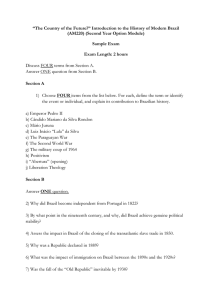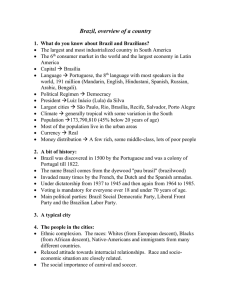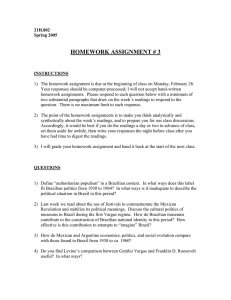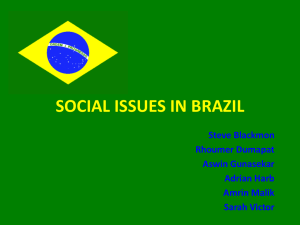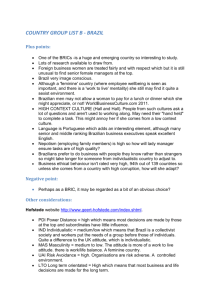Social Protection presentation in Buenos Aires
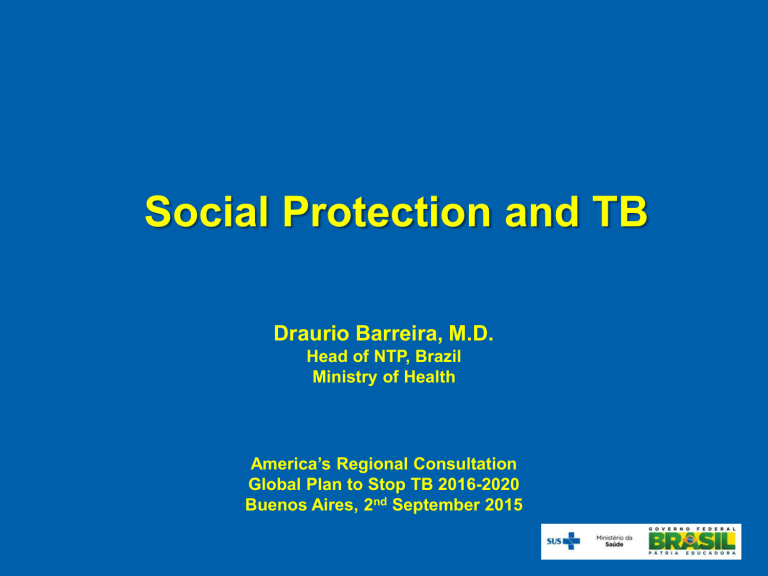
Social Protection and TB
Draurio Barreira, M.D.
Head of NTP, Brazil
Ministry of Health
America’s Regional Consultation
Global Plan to Stop TB 2016-2020
Buenos Aires, 2 nd September 2015
TB is a poverty related disease.
We won’t eliminate TB only with biomedical measures.
The End TB Strategy
Targets: 95% reduction in deaths and 90% reduction in incidence (<10 cases/100,000 population) by 2035
Integrated, patientcentered TB Care and
Prevention
Early diagnosis of TB including universal drug-susceptibility testing; systematic screening of contacts and high-risk groups
Treatment of all forms of TB including drug resistant TB with patient support
Collaborative TB/HIV activities and management of comorbidities
Preventive treatment for highrisk groups and vaccination of children
Bold policies and supportive systems
Intensified Research and
Innovation
Government stewardship, commitment and adequate resources for TB care and control with monitoring and evaluation
Engagement of communities, civil society organizations, and all public and private care providers
Universal health coverage policy; and regulatory framework for case notification, vital registration, drug quality and rational use, and infection control
Social protection, poverty alleviation, and actions on other determinants of TB
Discovery, development and rapid uptake of new tools, interventions and strategies
Operational research to optimize implementation and impact, and promote innovations
Social Determinants of TB
Brazil has a concentrated TB epidemic among vulnerable population. Relative risks:
Indigenous people: 3x Prisoners: 28x
PLHA: 28x
Homeless: 52x
TB incidence rate according to Brazilian vulnerable population
Per 100,000 inhab.
2000
1800
1600
1400
1200
1000
800
600
400
200
0
33,8
General population*
94,9
Indigenous**
939,9
Prisoners*
961,4
PLHA*
1747,5
Homeless***
Local and year of analysis:
* Brazil, 2014
** Brazil, 2013
***São Paulo State, 2011
TB incidence rate according to race. Brazil, 2013
Per 100,000 inhabitants
100
90
80
70
60
50
40
30
20
10
0
27,6
White
Sources: SES; MS/Sinan/DASIS; and IBGE .
39,8
Black
30,9
Asian Indigenous
94,9
TB new cases outcomes according to years of education. Brazil, 2013
100
90
80
70
60
50
40
30
20
10
0
81,9
67,4
Source: SES/MS/SINAN
Cure
7,7
9,0
Lost to follow up
More than 8 years studied illiterate
6,8
1,6
TB death
Social Protection Interventions
Social protection interventions for TB control:
The Brazilian Experience
• Public Health System (SUS): universal access, free of charge. “Right of all, duty of the State” (Federal
Constitution)
• “Bolsa Familia” Program (PBF): benefits families in poverty and extreme poverty. Sensitive, but not specific to TB patients
– Transfer income
– Education and health conditionalities
– Complementary programs
• Unified Registry for Social Programs (Cad.Único): instrument to collect data to identify and characterize poor families
– 27,506,752 Brazilian families registered in the Cad.Único
(around 82.4 million people registered)
– 13,797,102 Brazilian families benefited by cash transfer
(around 41.3 million people benefited)
Linkage between TB and Social Assistance
Information System
2010*
23,8% of new
TB cases registered in
CadUnico
2011*
25% of new TB cases registered in
CadUnico
* excluding prisoners and with low coverage of homeless and indigenous people
2015
We’ll perform a new linkage.
More than 50% of TB cases are expected to be found
TB new cases treatment outcome according to registration status in CadUnico. Brazil, 2010
% 100
80
60
40
20
0
69.7
73.8
77.7
Cure
10.0
8.8
8.7
8.6
6.5
1.9
Lost of follow up
No Cad.
Cad. no BF
TB death
BF
11.7
10.9
11.7
No information
Preliminary results of Brazilian studies analyzing Bolsa Familia and TB
Preliminary outcomes:
• 7% effectiveness of Programa Bolsa Familia (PBF) on
TB cure
• 8% impact of Programa
Bolsa Familia on TB incidence among Brazilian municipalities with large PBF coverage
What represents 7% of effectiveness of
Programa Bolsa Familia on TB cure in Brazil?
In 2010, 1,863 TB new cases received cash transfer after the TB treatment. The cure rate on this population was 76.3%
If those cases receiving cash transfer during the treatment, the probability of cure would increase 7%, arising from 76.3% to 81.6%
Which represents to cure 5 more people out of 100 new TB cases
Some examples of social protection in
Brazilian response to TB
• Standardized treatment regimens offered only by the State
• Proposal for the BRICS countries to produce and distribute TB first line drugs, free of charge, for all low and middle income countries (83 countries)
• Prioritizing most vulnerable populations, through joint actions with other related public sectors (intersectoral articulation)
• Articulation with civil society: social movement (NGOs),
Parliamentary Caucus, Subcommittee on Diseases Related to
Poverty, etc.
• Pursue a TB specific benefit through the inclusion of TB and other poverty related diseases in the Bolsa Família Program – add specific amount of $ to TB patients
Draurio Barreira, M.D.
+ 55 61 3213 8234 draurio.barreira@saude.gov.br
